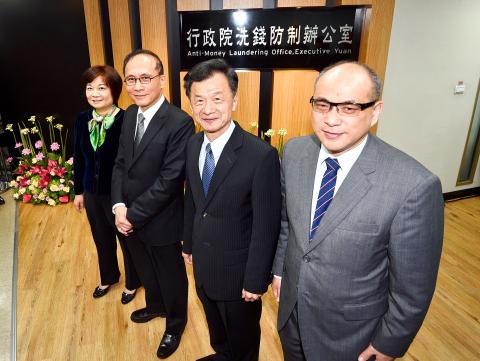The Executive Yuan yesterday launched its Anti-Money Laundering Office to clamp down on money laundering and improve the nation’s financial transparency.
“Taiwan is the first nation in the Asia-Pacific region to legislate against money laundering, but in the past 10 years, Taiwan has been falling behind in this area and might even be listed on the Asia-Pacific Group on Money Laundering watch list,” Premier Lin Chuan (林全) said at the office’s launch ceremony in Taipei.
Stricter law enforcement will not burden the financial sector, but could instead facilitate financial activities, Lin said.

Photo: Peter Lo, Taipei Times
“I have heard people say that offshore banking units would leave the nation if the Money Laundering Control Act (洗錢防制法) was enforced more rigorously, or it would affect personal and financial privacy. These are unproductive thoughts. We want people to cooperate with the government in preventing money laundering to rebuild the financial system and transform it into a more transparent and regulated environment,” Lin said.
Minister of Justice Chiu Tai-san (邱太三) said the financial sector has long neglected the importance of cracking down on money laundering, resulting in the violation of US money laundering rules by the Mega International Commercial Bank’s New York branch, for which the bank was issued a US$180 million fine in August last year.
The office is to ensure legal compliance and prevent the laundering of illegal assets on an international level, Chiu said.
All high-level officials of the executive, legislative and judicial branches of the government would be under the office’s regulation to supervise their loans and real-estate transactions, Deputy Minister of Justice Chen Ming-tang (陳明堂) said.
Relatives, close friends and aides of the officials would also be regulated, and any monetary transaction would be reviewed.
The office has of 19 staff members and is to be headed by Deputy Minister of Justice Tsai Pi-chung (蔡碧仲).

A preclearance service to facilitate entry for people traveling to select airports in Japan would be available from Thursday next week to Feb. 25 at Taiwan Taoyuan International Airport, Taoyuan International Airport Corp (TIAC) said on Tuesday. The service was first made available to Taiwanese travelers throughout the winter vacation of 2024 and during the Lunar New Year holiday. In addition to flights to the Japanese cities of Hakodate, Asahikawa, Akita, Sendai, Niigata, Okayama, Takamatsu, Kumamoto and Kagoshima, the service would be available to travelers to Kobe and Oita. The service can be accessed by passengers of 15 flight routes operated by

Alain Robert, known as the "French Spider-Man," praised Alex Honnold as exceptionally well-prepared after the US climber completed a free solo ascent of Taipei 101 yesterday. Robert said Honnold's ascent of the 508m-tall skyscraper in just more than one-and-a-half hours without using safety ropes or equipment was a remarkable achievement. "This is my life," he said in an interview conducted in French, adding that he liked the feeling of being "on the edge of danger." The 63-year-old Frenchman climbed Taipei 101 using ropes in December 2004, taking about four hours to reach the top. On a one-to-10 scale of difficulty, Robert said Taipei 101

Taiwanese and US defense groups are collaborating to introduce deployable, semi-autonomous manufacturing systems for drones and components in a boost to the nation’s supply chain resilience. Taiwan’s G-Tech Optroelectronics Corp subsidiary GTOC and the US’ Aerkomm Inc on Friday announced an agreement with fellow US-based Firestorm Lab to adopt the latter’s xCell, a technology featuring 3D printers fitted in 6.1m container units. The systems enable aerial platforms and parts to be produced in high volumes from dispersed nodes capable of rapid redeployment, to minimize the risk of enemy strikes and to meet field requirements, they said. Firestorm chief technology officer Ian Muceus said

MORE FALL: An investigation into one of Xi’s key cronies, part of a broader ‘anti-corruption’ drive, indicates that he might have a deep distrust in the military, an expert said China’s latest military purge underscores systemic risks in its shift from collective leadership to sole rule under Chinese President Xi Jinping (習近平), and could disrupt its chain of command and military capabilities, a national security official said yesterday. If decisionmaking within the Chinese Communist Party has become “irrational” under one-man rule, the Taiwan Strait and the regional situation must be approached with extreme caution, given unforeseen risks, they added. The anonymous official made the remarks as China’s Central Military Commission Vice Chairman Zhang Youxia (張又俠) and Joint Staff Department Chief of Staff Liu Zhenli (劉振立) were reportedly being investigated for suspected “serious